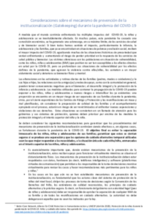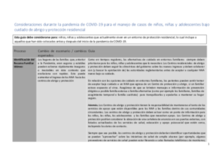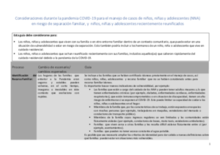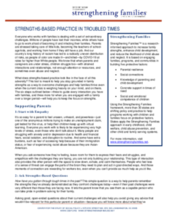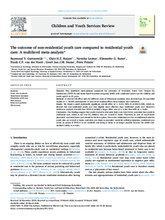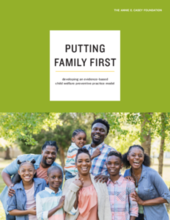This page contains documents and other resources related to children's care in the Americas. Browse resources by region, country, or category.
Displaying 101 - 110 of 566
Este documento presenta recomendaciones para garantizar que los procedimientos del mecanismo de prevención de la institucionalización continúen siendo efectivos o, en algunos casos, se fortalezcan durante la pandemia de la COVID-19.
Esta guía debe considerarse para: niños, niñas y adolescentes que actualmente viven en un entorno de protección residencial, lo cual incluye a aquellos que han sido colocados antes y después del inicio de la pandemia de COVID-19.
Esta guía debe considerarse para los niños, niñas y adolescentes que viven con su familia que puede estar en una situación de vulnerabilidad o estar en riesgo de separación y también los niños, niñas o adolescentes que se han reunificado recientemente con sus familias, incluidos aquellos(as) que salieron rápidamente del cuidado residencial debido a la pandemia de la COVID-19.
This tool is meant to help practitioners stay grounded in family strengths as a way to overcome challenges and help families thrive even when the current COVID-19 crisis is weighing heavily on practitioners' and families' minds.
This first How We Care series presents the work of three Family for Every Child Members to help combat child sexual abuse in their regions.
El programa de Educación del Diálogo Interamericano, Early Childhood Development Action Network (ECDAN) y la Oficina Regional para América Latina y el Caribe de UNICEF convocan un seminario virtual para reflexionar sobre cómo la emergencia ha afectado a la primera infancia y qué respuestas están organizando los gobiernos para responder a la cambiante situación y asegurar que los objetivos de desarrollo infantil continúan recibiendo la atención necesaria.
A cost analysis was conducted as part of a 5-year, federally funded statewide demonstration project to install universal trauma screening in one U.S. state’s child welfare system.
This article provides a conceptual depiction of how schools and treatment foster parents partnerships can be formed and maintained.
This multilevel meta-analysis compared the outcomes of Treatment Foster Care Oregon for Adolescents (TFCO-A) and home-based treatment programs (HBT) with residential youth care for children and youth aged 0 to 23 years.
This paper from the Annie E. Casey Foundation provides guidance for state child welfare agencies on what to consider when developing a preventive practice model that aligns with the requirements of Family First, addresses the unique needs of families within local communities and ensures that selected programs and practices are feasible to implement with quality.


